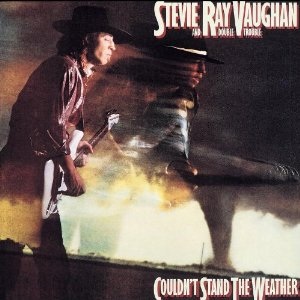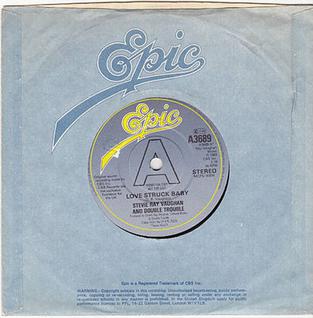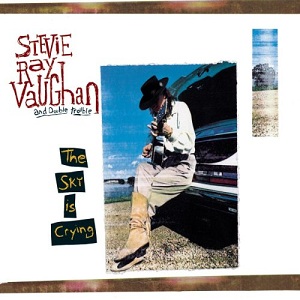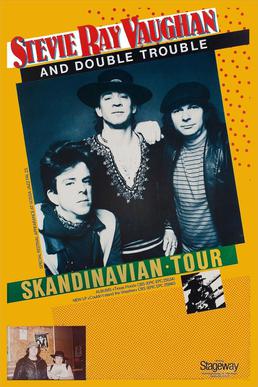
Stephen Ray Vaughan was an American musician, best known as the guitarist and frontman of the blues rock trio Stevie Ray Vaughan and Double Trouble. Although his mainstream career spanned only seven years, he is regarded as one of the most influential musicians in the history of blues music, and one of the greatest guitarists of all time. He was the younger brother of guitarist Jimmie Vaughan.

Texas Flood is the debut studio album by the American blues rock band Stevie Ray Vaughan and Double Trouble, released on June 13, 1983, by Epic Records. The album was named after a cover song featured on the album, "Texas Flood", which was first recorded by blues singer Larry Davis in 1958. Produced by the band and recording engineer Richard Mullen, Texas Flood was recorded in the space of three days at Jackson Browne's personal recording studio in Los Angeles. Vaughan wrote six of the album's ten tracks.

Couldn't Stand the Weather is the second studio album by American blues rock band Stevie Ray Vaughan and Double Trouble. It was released on May 15, 1984, by Epic Records as the follow-up to the band's critically and commercially successful 1983 album, Texas Flood. Recording sessions took place in January 1984 at the Power Station in New York City.

Double Trouble is an American blues rock band from Austin, Texas, which served as the backing band for singer-guitarist Stevie Ray Vaughan. The group was active throughout the 1980s and contributed to reviving blues music, inspiring many later blues and rock acts. Formed in Austin, Texas in 1978, the group went through several early line-up changes before settling on a power trio consisting of Vaughan, Chris Layton (drums), Tommy Shannon (bass). They became a four-piece by 1985 after adding Reese Wynans (keyboards). Whilst with Vaughan they were billed Stevie Ray Vaughan and Double Trouble. Rooted in blues and rock music, the group worked in various genres ranging from ballads to soul, often incorporating jazz and other musical elements.

"Love Struck Baby" is a blues rock song performed by Stevie Ray Vaughan and Double Trouble. Vaughan wrote the song about the night that he moved in with his then-wife, Lenny. The track was produced by Vaughan for the band's debut album Texas Flood, recorded in Los Angeles. "Love Struck Baby" was the first single from Texas Flood, released by Epic Records in the United States and United Kingdom. In the song's accompanying music video, bassist Tommy Shannon and drummer Chris Layton are shown relaxing at a bar before Vaughan enters and starts performing the song for a crowd. "Love Struck Baby" was a concert favorite for fans of the band; Vaughan would frequently play the guitar behind his head for part of the solo.

The Sky Is Crying is the fifth and final studio album by Stevie Ray Vaughan and Double Trouble, compiling songs recorded throughout most of their career. Released 14 months after Vaughan's death in 1990, the album features ten previously unreleased tracks recorded between 1984 and 1989. Only one title, "Empty Arms", appeared on any of the group's previous albums. The tracks were compiled by Vaughan's brother, Jimmie Vaughan, and was Vaughan's highest charting album at number 10.

Live at Carnegie Hall is the third live album by American blues rock band Stevie Ray Vaughan and Double Trouble, released by Epic Records in July 1997. The album consists of live selections from their sold-out October 4, 1984, benefit concert at Carnegie Hall for the T.J. Martell Foundation. Backed by a ten-piece big band for the second half of the event, Vaughan had celebrated his thirtieth birthday the night before, and called the concert his "best birthday ever, forever". The band's double-set performance, which included several blues and R&B standards, was highly successful, receiving mostly positive reviews from music critics.
"Lenny" is the tenth and final track on the first Stevie Ray Vaughan and Double Trouble album Texas Flood. The song is in 4/4 time and notated in the key of E flat major. It is played very slowly and freely, with Vaughan alternating between jazz-inflected chords and solo runs. The main chord featured in the song is a movable major 6th chord to which Vaughan applies moderate vibrato with the tremolo bar. The solos incorporate the E major scale, the E minor pentatonic scale, and the E Minor blues scale. Its style is influenced by Jimi Hendrix ballads like "The Wind Cries Mary". The song was written and named for Vaughan's wife at the time, Lenora. Vaughan also named one of his guitars "Lenny", which he used on "Lenny" and on his later instrumental ballad, "Riviera Paradise". The track was often played at live shows.

The Texas Flood World Tour was a concert tour in North America and Western Europe, undertaken by American blues rock band Stevie Ray Vaughan and Double Trouble in 1983 and 1984. The band had released their debut album, Texas Flood, a week before the tour began.

The Couldn't Stand the Weather Tour was a worldwide concert tour by blues rock band Stevie Ray Vaughan and Double Trouble. Produced in support of their 1984 album Couldn't Stand the Weather, the tour visited North America, Europe, Australasia and Japan from 1984 to 1985. To reflect the new musical direction that the group took with Couldn't Stand the Weather, the tour was aimed to differ from their past and surpass expectations of the band. In comparison to Vaughan and Double Trouble's modest stage setup from the previous Texas Flood Tour, the Couldn't Stand the Weather Tour involved a slightly more elaborate production. It utilized grander amplifier setups and sound systems to take advantage of the larger venues in which they performed. To avoid their renowned strictly blues material, Vaughan and Double Trouble embodied a more expanded and varied repertoire during performances. In disparity to the previous tour, each of the Couldn't Stand the Weather shows opened with mostly the same three songs before other material was played. The album and the tour were the beginnings of the group's mid-eighties musical development.
The Soul to Soul Tour was a concert tour through North America, Europe and Australasia, undertaken by American blues rock band Stevie Ray Vaughan and Double Trouble from 1985 through 1986. At the beginning of the tour, the band had finished recording their album Soul to Soul. Their commercial and critical acclaim had been demonstrated during the Couldn't Stand the Weather Tour in 1984, when they had played before a sold-out audience at Carnegie Hall. Longing for opportunities to expand the group's lineup, Vaughan and Double Trouble hired keyboardist Reese Wynans during the Soul to Soul recording sessions in Dallas, Texas. Throughout the tour, the band's success was confirmed as their performances consistently amazed and gratified their audiences.

The Live Alive Tour was a concert tour through North America and Europe, undertaken by Stevie Ray Vaughan and Double Trouble from 1986 to 1988. At the start of the tour, Vaughan and bassist Tommy Shannon had both achieved sobriety. Their success with overcoming long-term drug and alcohol addiction had been attained by entering a rehabilitation facility, where they stayed for four weeks. Although Vaughan was nervous about performing while sober, he received encouragement from his bandmates. Throughout the tour during performances, Vaughan would warn his audiences about the dangers of substance abuse.

In Session is a blues album by Albert King with Stevie Ray Vaughan recorded live for television on December 6, 1983, at CHCH-TV studios in Hamilton, Ontario, when Vaughan was 29 and King was 60. It was released as an album on August 17, 1999, and re-released with a supplemental video recording on DVD on September 28, 2010. It has also been released on CD and SACD.

"The Sky Is Crying" is a blues standard written and initially recorded by Elmore James in 1959. Called "one of his most durable compositions", "The Sky Is Crying" became a R&B record chart hit and has been interpreted and recorded by numerous artists.

Stevie Ray Vaughan was an American blues rock guitarist, singer, and songwriter, and the frontman for the band Double Trouble. He is often regarded as one of the greatest guitarists and blues musicians of all time. During his career, he released four studio albums, one live album, and several singles.

"Double Trouble" is a blues song written and recorded by Chicago blues guitarist Otis Rush in 1958. Since its release as a single in 1959, the song has been recorded by several blues and other artists, including several versions by Eric Clapton. Stevie Ray Vaughan named his band "Double Trouble" after Rush's song. In 2008, Rush's original version was inducted into the Blues Foundation Hall of Fame, who called it a "minor-key masterpiece".

Live at Montreux 1982 & 1985 is the fourth live album of American blues musician Stevie Ray Vaughan and his band Double Trouble, recorded at the Montreux Jazz Festival on July 17, 1982 and July 15, 1985, and released November 20, 2001 on Epic Records. Neither are complete concerts.

In the early morning of Monday, August 27, 1990, American musician Stevie Ray Vaughan was killed in a helicopter crash near East Troy, Wisconsin, at age 35. He was one of the most influential blues guitarists of the 1980s, described by the Rock and Roll Hall of Fame as "the second coming of the blues".

Christopher Layton, also known as "Whipper", is an American drummer who rose to fame as one of the founding members of Double Trouble, a blues rock band led by Stevie Ray Vaughan.
















